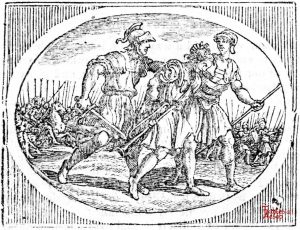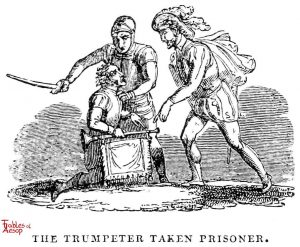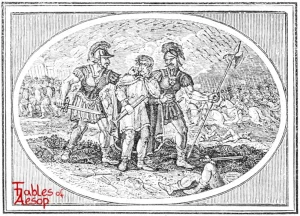Words may be deeds. Taken prisoner, a trumpeter pled for life based on not doing battle. But the call to battle was his undoing.
Words may be deeds.

Eliot/Jacobs Version
A Trumpeter during a battle ventured too near the enemy and was captured by them. They were about to proceed to put him to death when he begged them to hear his plea for mercy. “I do not fight,” said he, “and indeed carry no weapon; I only blow this trumpet, and surely that cannot harm you; then why should you kill me?”
“You may not fight yourself,” said the others, “but you encourage and guide your men to the fight.”

JBR Collection
Upon the defeat of an army in battle, a Trumpeter was taken prisoner. The soldiers were about to put him to death, when he cried, “Nay, gentlemen, why should you kill me? This hand of mine is guiltless of a single life.” “Yes,” replied the soldiers; “but with that braying instrument of yours you incite others, and you must share the same fate as they. ”

Townsend version
A trumpeter, bravely leading on the soldiers, was captured by the enemy. He cried out to his captors, “Pray spare me, and do not take my life without cause or without inquiry. I have not slain a single man of your troop. I have no arms, and carry nothing but this one brass trumpet.” “That is the very reason for which you should be put to death,” they said; “for, while you do not fight yourself, your trumpet stirs all the others to battle.”

Samuel Croxall
A TRUMPETER, being taken prisoner in a battle, begged hard for quarter, declaring his innocence, and protesting, that he neither had, nor could kill any man, bearing no arms but only his trumpet, which he was obliged to sound at the word of command. For that reason, replied his enemies, we are determined not to spare you; for though you yourself never fight, yet, with that wicked instrument of yours, you blow up animosity between other people, and so become the occasion of much bloodshed.
THE APPLICATION
A man may be guilty of murder, who has never handled a sword, or pulled a trigger, or lifted up his arm with any mischievous weapon. There is a little incendiary, called the tongue, which is more venomous than a poisoned arrow, and more killing than a two-edged sword. The moral of the fable therefore is this, what if in any civil insurrection, the persons taken in arms against the government deserve to die, much more do they, whose devilish tongues gave birth to the sedition, and excite the tumult. When wicked priests, instead of preaching peace and charity, employ that engine of scandal, their tongue, to foment rebellions, whether they succeed in their designs or no, they ought to be severely punished; for they have done what in them lay, to set folks together by the ears; they have blown the trumpet, and sounded the alarm; and if thousands are not destroyed by the sword it is none of their fault.

Thomas Bewick (The Trumpeter Taken Prisoner)
A Trumpeter, being taken prisoner in battle, begged hard for quarter, declaring his innocence, and protesting, that he neither had killed nor could kill any man, bearing no arms but his trumpet, which he was obliged to sound at the word of command. For that reason, replied his enemies, we are determined not to spare you; for though you yourself never fight, yet, with that wicked instrument of- yours, you blow up animosity among other people, and so become the cause of much bloodshed.
APPLICATION.
The fomenter of mischief is at least as culpable as he who puts it in execution. A man may be guilty of murder, who never has handled a sword or pulled a trigger, or lifted up his arm with any mischievous weapon. There is a little incendiary called the tongue, which is more venomous than a poisoned arrow, and more killing than a two-edged sword. The moral of the Fable therefore is this, that if in any civil insurrection, the persons taken in arms against the government deserve to die, much more do they whose devilish tongues or pens gave birth to the sedition, and excited the tumult. The Fable is also equally applicable to those evil counsellors, who excite corrupt or wicked governments to sap and undermine, and then to overturn the just laws and liberties of a whole people; or involve them in cruel offensive wars, in which they cause thousands upon thousands of swords to be drawn, and whole armies of men to be cut in pieces, while they themselves coolly sit out of danger, and calculate the gains they derive from the wide-spreading desolation. War is the most horrid custom that ever resulted from human wickedness, and is caused only by the ignorance of the people, or the wickedness of governments.
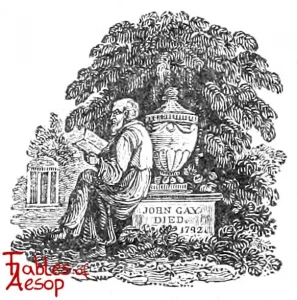

L’Estrange version
Upon the rout of an army there was a trumpeter made a pris’ner, and as the soldiers were about to cut his throat; Gentlemen (says he) why should you kill a man that kills no body? You shall die the rather for that, cries one of the company, for being so mean a rascal, as to set other people together by the ears, without fighting your self.
Moral
He that provokes and incites mischief, is the doer of it. ‘Tis the man that kills me, the bullet is only a passive instrument to serve his end that directs it.

Crane Poetry Visual
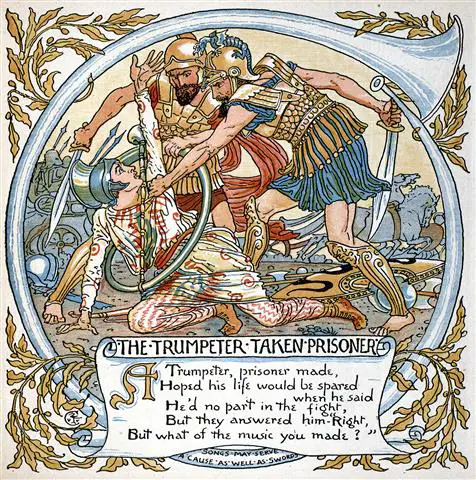
A Trumpeter, prisoner made,
Hoped his life would be spared when he said
He’d no part in the fight,
But they answered him “Right,
But what of the music you made?”
Songs may serve a cause as well as swords.

Tubicen Captus
Tubicen, ab hostibus captus, “Ne me,” inquit, “interficite; nam inermis sum, neque quidquam habeo praeter hanc tubam.” At hostes “Propter hoc ipsum,” inquiunt, “te interimemus quod, cum ipse pugnandi sis imperitus, alios ad pugnam incitare soles.”
Perry #370
